Reflective Journal: Developing Leadership Skills in People Management
VerifiedAdded on 2023/06/04
|11
|2940
|183
Journal and Reflective Writing
AI Summary
This reflective journal explores the author's leadership philosophy, mission, and values, emphasizing adaptability, inspiration, and continuous learning. It identifies key leadership qualities such as communication, delegation, creativity, resilience, and accountability as crucial for effective people management. The journal delves into the importance of each quality, supported by literature, and sets SMART goals for personal development in these areas. The author outlines strategies for achieving these goals, including risk-taking, seeking assistance, reading inspiring texts, practicing gratitude, and increasing pace. The journal underscores the significance of self-awareness, continuous improvement, and a proactive approach to leadership development.
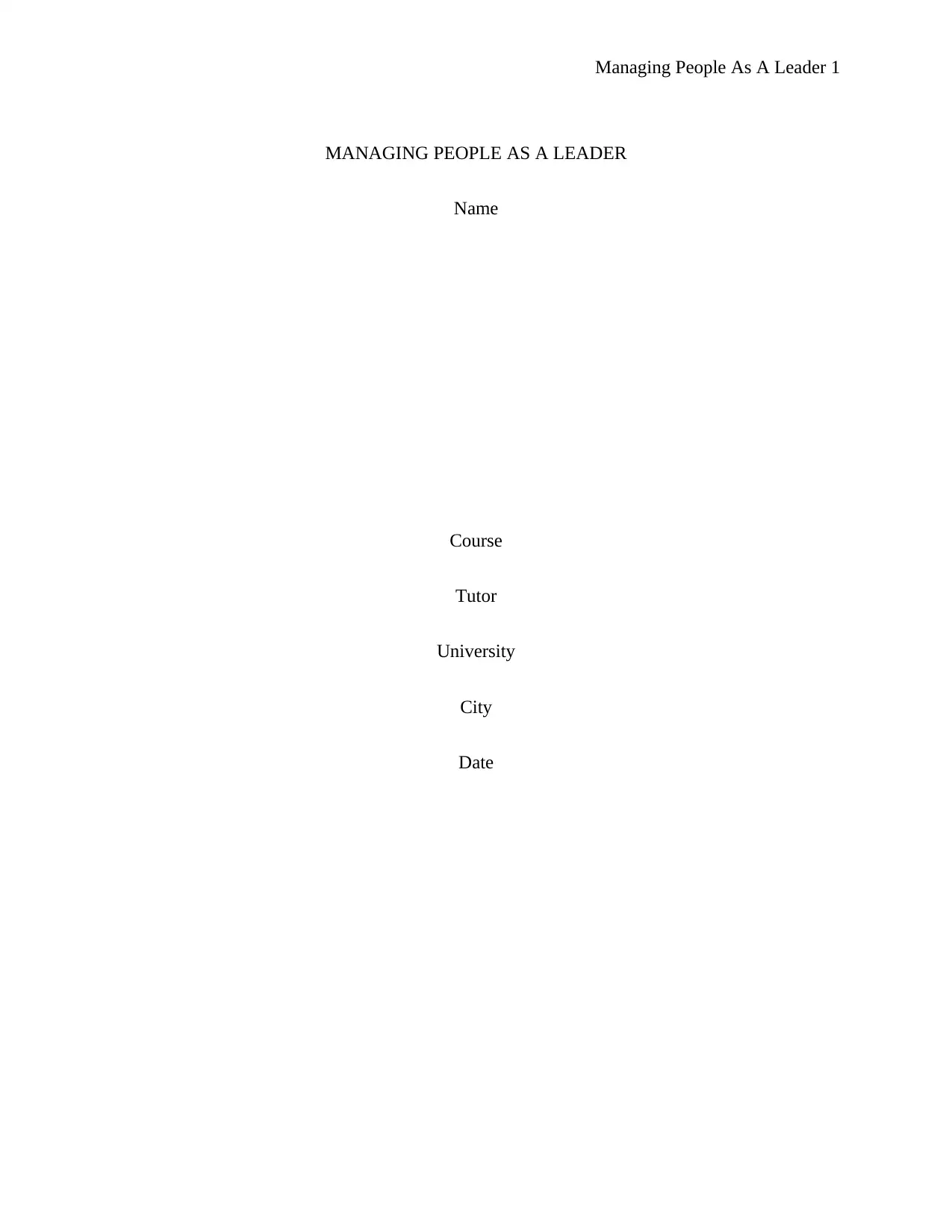
Managing People As A Leader 1
MANAGING PEOPLE AS A LEADER
Name
Course
Tutor
University
City
Date
MANAGING PEOPLE AS A LEADER
Name
Course
Tutor
University
City
Date
Paraphrase This Document
Need a fresh take? Get an instant paraphrase of this document with our AI Paraphraser
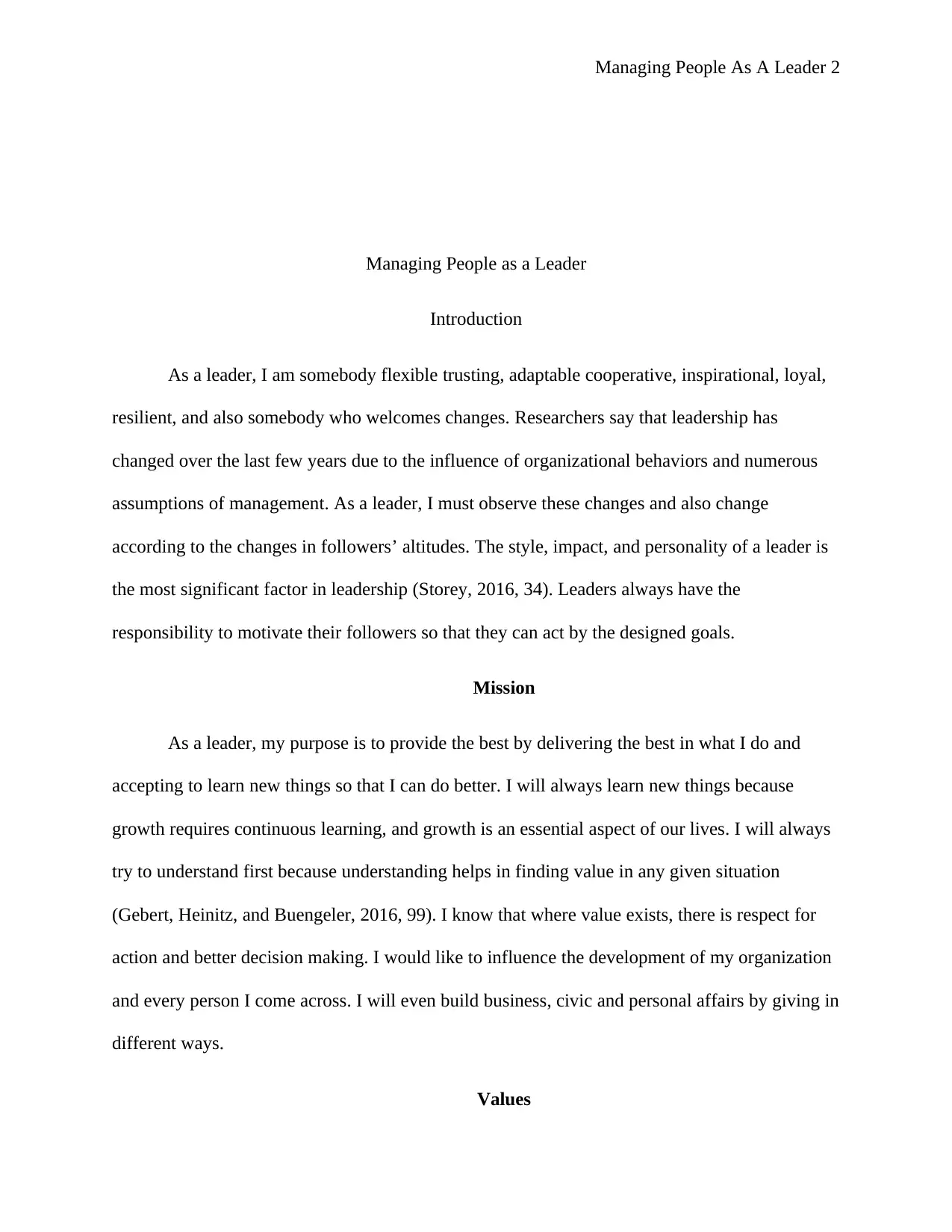
Managing People As A Leader 2
Managing People as a Leader
Introduction
As a leader, I am somebody flexible trusting, adaptable cooperative, inspirational, loyal,
resilient, and also somebody who welcomes changes. Researchers say that leadership has
changed over the last few years due to the influence of organizational behaviors and numerous
assumptions of management. As a leader, I must observe these changes and also change
according to the changes in followers’ altitudes. The style, impact, and personality of a leader is
the most significant factor in leadership (Storey, 2016, 34). Leaders always have the
responsibility to motivate their followers so that they can act by the designed goals.
Mission
As a leader, my purpose is to provide the best by delivering the best in what I do and
accepting to learn new things so that I can do better. I will always learn new things because
growth requires continuous learning, and growth is an essential aspect of our lives. I will always
try to understand first because understanding helps in finding value in any given situation
(Gebert, Heinitz, and Buengeler, 2016, 99). I know that where value exists, there is respect for
action and better decision making. I would like to influence the development of my organization
and every person I come across. I will even build business, civic and personal affairs by giving in
different ways.
Values
Managing People as a Leader
Introduction
As a leader, I am somebody flexible trusting, adaptable cooperative, inspirational, loyal,
resilient, and also somebody who welcomes changes. Researchers say that leadership has
changed over the last few years due to the influence of organizational behaviors and numerous
assumptions of management. As a leader, I must observe these changes and also change
according to the changes in followers’ altitudes. The style, impact, and personality of a leader is
the most significant factor in leadership (Storey, 2016, 34). Leaders always have the
responsibility to motivate their followers so that they can act by the designed goals.
Mission
As a leader, my purpose is to provide the best by delivering the best in what I do and
accepting to learn new things so that I can do better. I will always learn new things because
growth requires continuous learning, and growth is an essential aspect of our lives. I will always
try to understand first because understanding helps in finding value in any given situation
(Gebert, Heinitz, and Buengeler, 2016, 99). I know that where value exists, there is respect for
action and better decision making. I would like to influence the development of my organization
and every person I come across. I will even build business, civic and personal affairs by giving in
different ways.
Values
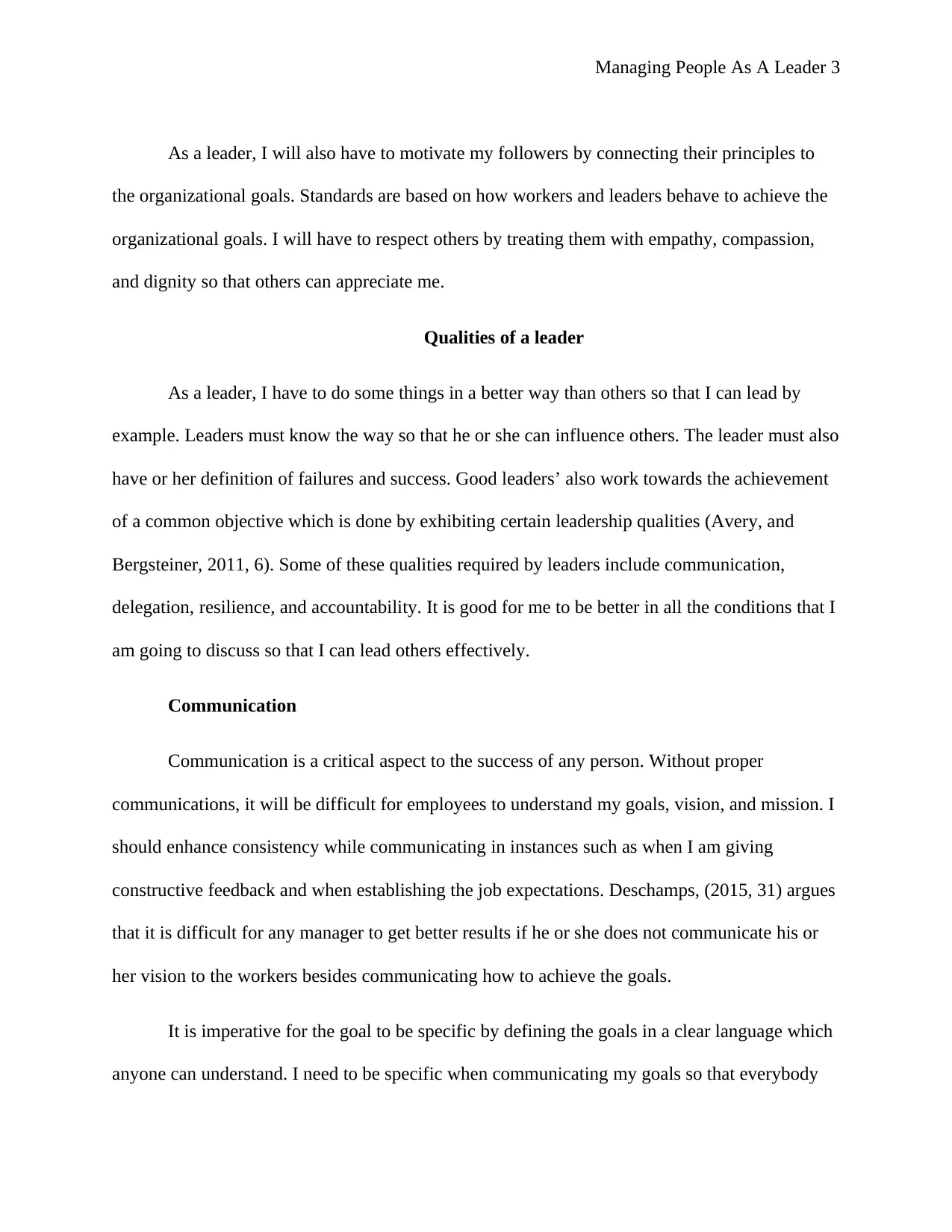
Managing People As A Leader 3
As a leader, I will also have to motivate my followers by connecting their principles to
the organizational goals. Standards are based on how workers and leaders behave to achieve the
organizational goals. I will have to respect others by treating them with empathy, compassion,
and dignity so that others can appreciate me.
Qualities of a leader
As a leader, I have to do some things in a better way than others so that I can lead by
example. Leaders must know the way so that he or she can influence others. The leader must also
have or her definition of failures and success. Good leaders’ also work towards the achievement
of a common objective which is done by exhibiting certain leadership qualities (Avery, and
Bergsteiner, 2011, 6). Some of these qualities required by leaders include communication,
delegation, resilience, and accountability. It is good for me to be better in all the conditions that I
am going to discuss so that I can lead others effectively.
Communication
Communication is a critical aspect to the success of any person. Without proper
communications, it will be difficult for employees to understand my goals, vision, and mission. I
should enhance consistency while communicating in instances such as when I am giving
constructive feedback and when establishing the job expectations. Deschamps, (2015, 31) argues
that it is difficult for any manager to get better results if he or she does not communicate his or
her vision to the workers besides communicating how to achieve the goals.
It is imperative for the goal to be specific by defining the goals in a clear language which
anyone can understand. I need to be specific when communicating my goals so that everybody
As a leader, I will also have to motivate my followers by connecting their principles to
the organizational goals. Standards are based on how workers and leaders behave to achieve the
organizational goals. I will have to respect others by treating them with empathy, compassion,
and dignity so that others can appreciate me.
Qualities of a leader
As a leader, I have to do some things in a better way than others so that I can lead by
example. Leaders must know the way so that he or she can influence others. The leader must also
have or her definition of failures and success. Good leaders’ also work towards the achievement
of a common objective which is done by exhibiting certain leadership qualities (Avery, and
Bergsteiner, 2011, 6). Some of these qualities required by leaders include communication,
delegation, resilience, and accountability. It is good for me to be better in all the conditions that I
am going to discuss so that I can lead others effectively.
Communication
Communication is a critical aspect to the success of any person. Without proper
communications, it will be difficult for employees to understand my goals, vision, and mission. I
should enhance consistency while communicating in instances such as when I am giving
constructive feedback and when establishing the job expectations. Deschamps, (2015, 31) argues
that it is difficult for any manager to get better results if he or she does not communicate his or
her vision to the workers besides communicating how to achieve the goals.
It is imperative for the goal to be specific by defining the goals in a clear language which
anyone can understand. I need to be specific when communicating my goals so that everybody
⊘ This is a preview!⊘
Do you want full access?
Subscribe today to unlock all pages.

Trusted by 1+ million students worldwide
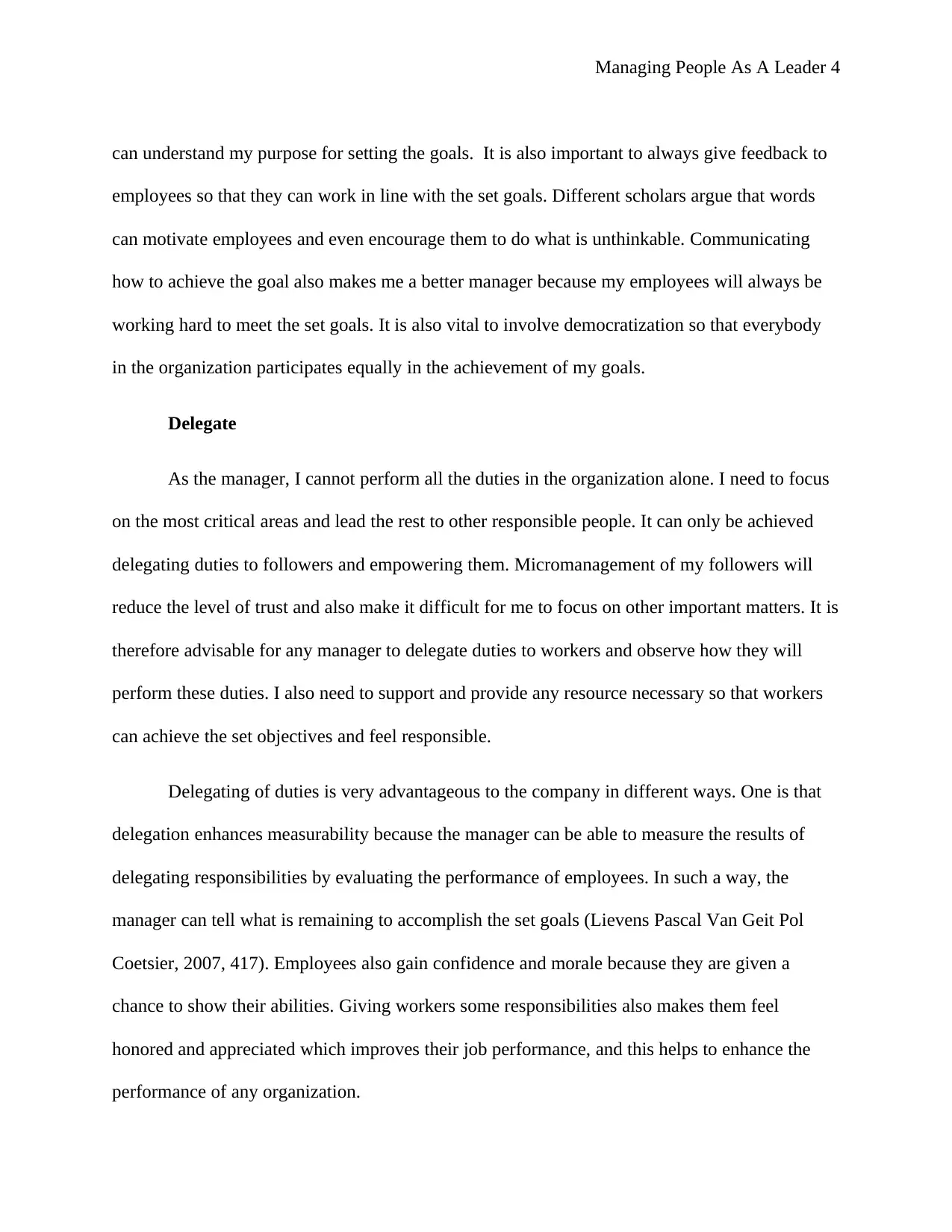
Managing People As A Leader 4
can understand my purpose for setting the goals. It is also important to always give feedback to
employees so that they can work in line with the set goals. Different scholars argue that words
can motivate employees and even encourage them to do what is unthinkable. Communicating
how to achieve the goal also makes me a better manager because my employees will always be
working hard to meet the set goals. It is also vital to involve democratization so that everybody
in the organization participates equally in the achievement of my goals.
Delegate
As the manager, I cannot perform all the duties in the organization alone. I need to focus
on the most critical areas and lead the rest to other responsible people. It can only be achieved
delegating duties to followers and empowering them. Micromanagement of my followers will
reduce the level of trust and also make it difficult for me to focus on other important matters. It is
therefore advisable for any manager to delegate duties to workers and observe how they will
perform these duties. I also need to support and provide any resource necessary so that workers
can achieve the set objectives and feel responsible.
Delegating of duties is very advantageous to the company in different ways. One is that
delegation enhances measurability because the manager can be able to measure the results of
delegating responsibilities by evaluating the performance of employees. In such a way, the
manager can tell what is remaining to accomplish the set goals (Lievens Pascal Van Geit Pol
Coetsier, 2007, 417). Employees also gain confidence and morale because they are given a
chance to show their abilities. Giving workers some responsibilities also makes them feel
honored and appreciated which improves their job performance, and this helps to enhance the
performance of any organization.
can understand my purpose for setting the goals. It is also important to always give feedback to
employees so that they can work in line with the set goals. Different scholars argue that words
can motivate employees and even encourage them to do what is unthinkable. Communicating
how to achieve the goal also makes me a better manager because my employees will always be
working hard to meet the set goals. It is also vital to involve democratization so that everybody
in the organization participates equally in the achievement of my goals.
Delegate
As the manager, I cannot perform all the duties in the organization alone. I need to focus
on the most critical areas and lead the rest to other responsible people. It can only be achieved
delegating duties to followers and empowering them. Micromanagement of my followers will
reduce the level of trust and also make it difficult for me to focus on other important matters. It is
therefore advisable for any manager to delegate duties to workers and observe how they will
perform these duties. I also need to support and provide any resource necessary so that workers
can achieve the set objectives and feel responsible.
Delegating of duties is very advantageous to the company in different ways. One is that
delegation enhances measurability because the manager can be able to measure the results of
delegating responsibilities by evaluating the performance of employees. In such a way, the
manager can tell what is remaining to accomplish the set goals (Lievens Pascal Van Geit Pol
Coetsier, 2007, 417). Employees also gain confidence and morale because they are given a
chance to show their abilities. Giving workers some responsibilities also makes them feel
honored and appreciated which improves their job performance, and this helps to enhance the
performance of any organization.
Paraphrase This Document
Need a fresh take? Get an instant paraphrase of this document with our AI Paraphraser
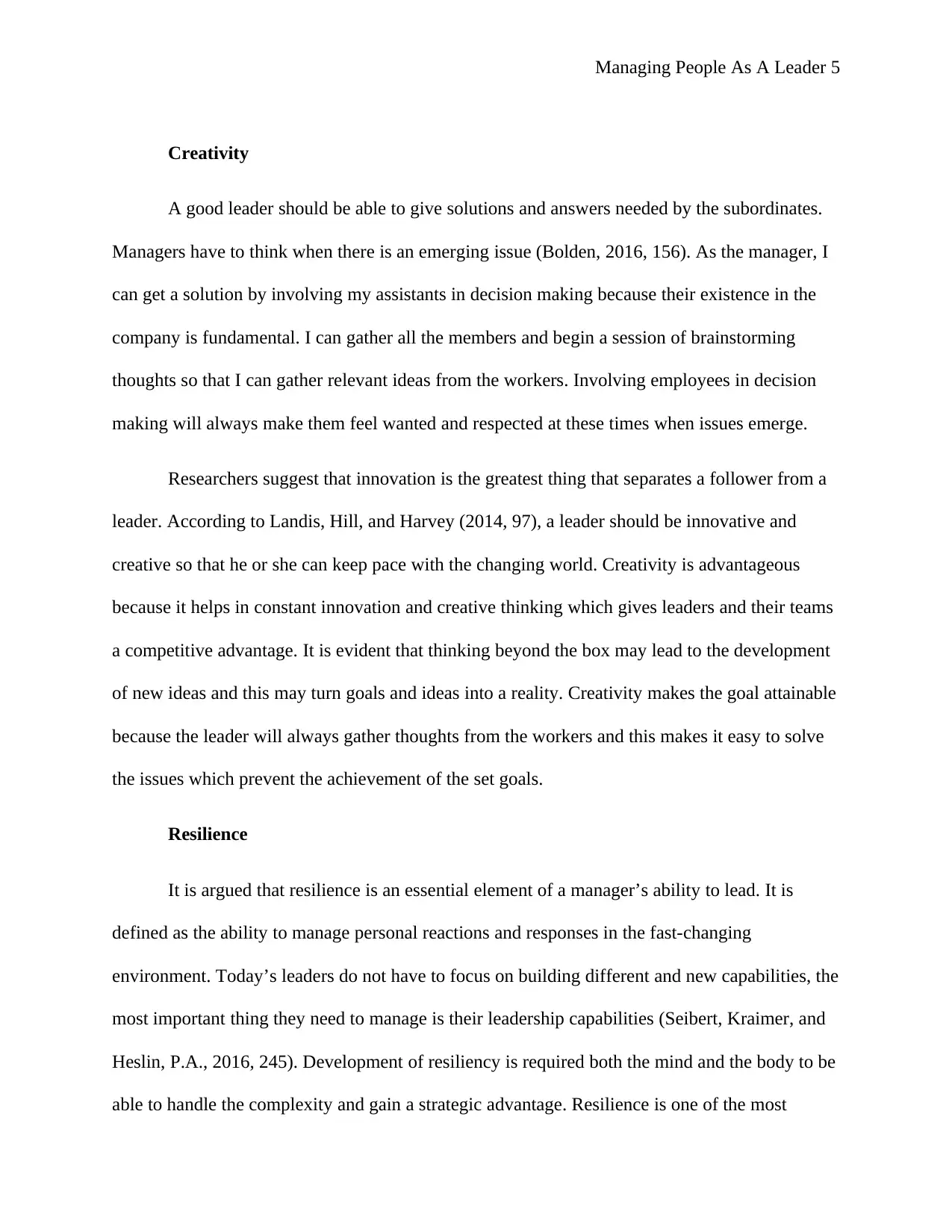
Managing People As A Leader 5
Creativity
A good leader should be able to give solutions and answers needed by the subordinates.
Managers have to think when there is an emerging issue (Bolden, 2016, 156). As the manager, I
can get a solution by involving my assistants in decision making because their existence in the
company is fundamental. I can gather all the members and begin a session of brainstorming
thoughts so that I can gather relevant ideas from the workers. Involving employees in decision
making will always make them feel wanted and respected at these times when issues emerge.
Researchers suggest that innovation is the greatest thing that separates a follower from a
leader. According to Landis, Hill, and Harvey (2014, 97), a leader should be innovative and
creative so that he or she can keep pace with the changing world. Creativity is advantageous
because it helps in constant innovation and creative thinking which gives leaders and their teams
a competitive advantage. It is evident that thinking beyond the box may lead to the development
of new ideas and this may turn goals and ideas into a reality. Creativity makes the goal attainable
because the leader will always gather thoughts from the workers and this makes it easy to solve
the issues which prevent the achievement of the set goals.
Resilience
It is argued that resilience is an essential element of a manager’s ability to lead. It is
defined as the ability to manage personal reactions and responses in the fast-changing
environment. Today’s leaders do not have to focus on building different and new capabilities, the
most important thing they need to manage is their leadership capabilities (Seibert, Kraimer, and
Heslin, P.A., 2016, 245). Development of resiliency is required both the mind and the body to be
able to handle the complexity and gain a strategic advantage. Resilience is one of the most
Creativity
A good leader should be able to give solutions and answers needed by the subordinates.
Managers have to think when there is an emerging issue (Bolden, 2016, 156). As the manager, I
can get a solution by involving my assistants in decision making because their existence in the
company is fundamental. I can gather all the members and begin a session of brainstorming
thoughts so that I can gather relevant ideas from the workers. Involving employees in decision
making will always make them feel wanted and respected at these times when issues emerge.
Researchers suggest that innovation is the greatest thing that separates a follower from a
leader. According to Landis, Hill, and Harvey (2014, 97), a leader should be innovative and
creative so that he or she can keep pace with the changing world. Creativity is advantageous
because it helps in constant innovation and creative thinking which gives leaders and their teams
a competitive advantage. It is evident that thinking beyond the box may lead to the development
of new ideas and this may turn goals and ideas into a reality. Creativity makes the goal attainable
because the leader will always gather thoughts from the workers and this makes it easy to solve
the issues which prevent the achievement of the set goals.
Resilience
It is argued that resilience is an essential element of a manager’s ability to lead. It is
defined as the ability to manage personal reactions and responses in the fast-changing
environment. Today’s leaders do not have to focus on building different and new capabilities, the
most important thing they need to manage is their leadership capabilities (Seibert, Kraimer, and
Heslin, P.A., 2016, 245). Development of resiliency is required both the mind and the body to be
able to handle the complexity and gain a strategic advantage. Resilience is one of the most
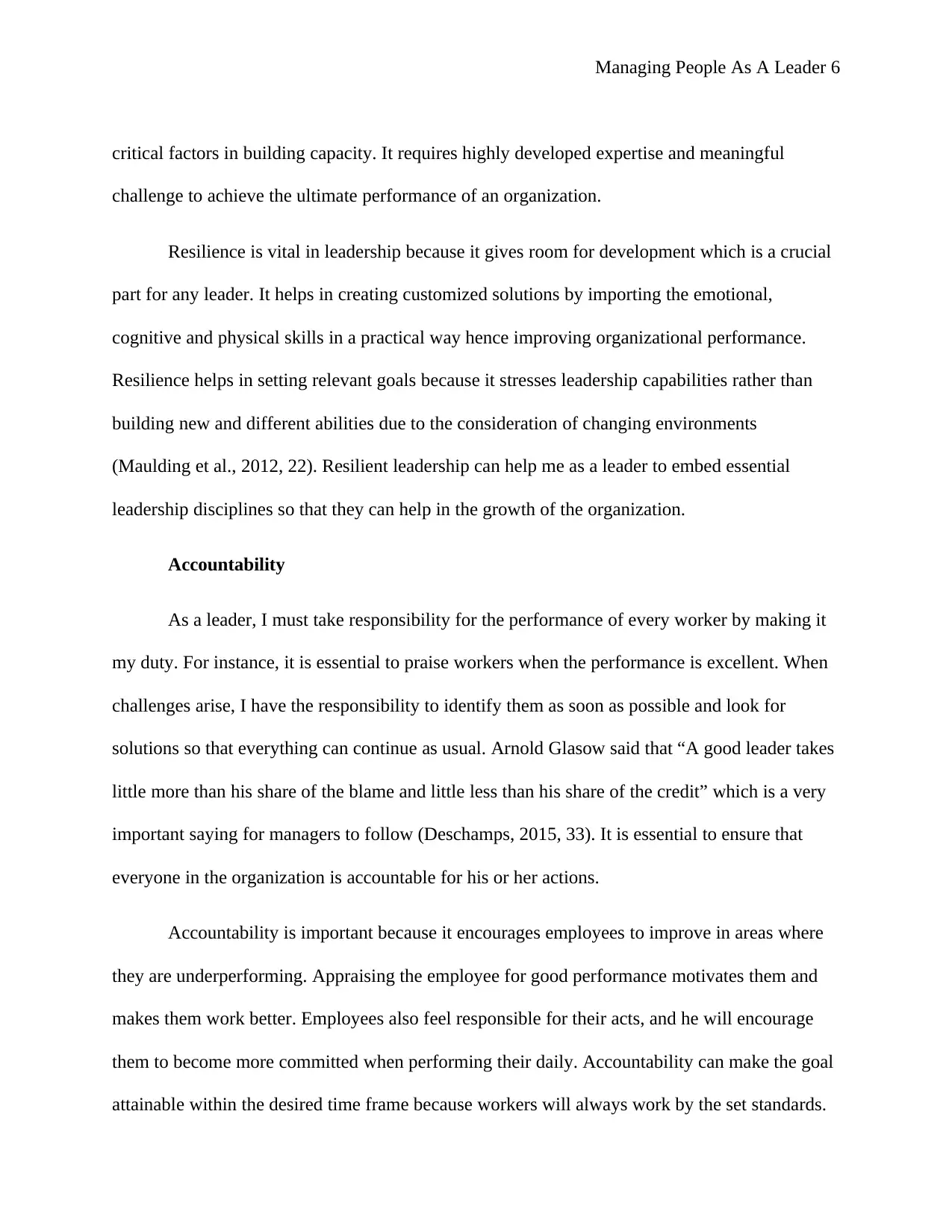
Managing People As A Leader 6
critical factors in building capacity. It requires highly developed expertise and meaningful
challenge to achieve the ultimate performance of an organization.
Resilience is vital in leadership because it gives room for development which is a crucial
part for any leader. It helps in creating customized solutions by importing the emotional,
cognitive and physical skills in a practical way hence improving organizational performance.
Resilience helps in setting relevant goals because it stresses leadership capabilities rather than
building new and different abilities due to the consideration of changing environments
(Maulding et al., 2012, 22). Resilient leadership can help me as a leader to embed essential
leadership disciplines so that they can help in the growth of the organization.
Accountability
As a leader, I must take responsibility for the performance of every worker by making it
my duty. For instance, it is essential to praise workers when the performance is excellent. When
challenges arise, I have the responsibility to identify them as soon as possible and look for
solutions so that everything can continue as usual. Arnold Glasow said that “A good leader takes
little more than his share of the blame and little less than his share of the credit” which is a very
important saying for managers to follow (Deschamps, 2015, 33). It is essential to ensure that
everyone in the organization is accountable for his or her actions.
Accountability is important because it encourages employees to improve in areas where
they are underperforming. Appraising the employee for good performance motivates them and
makes them work better. Employees also feel responsible for their acts, and he will encourage
them to become more committed when performing their daily. Accountability can make the goal
attainable within the desired time frame because workers will always work by the set standards.
critical factors in building capacity. It requires highly developed expertise and meaningful
challenge to achieve the ultimate performance of an organization.
Resilience is vital in leadership because it gives room for development which is a crucial
part for any leader. It helps in creating customized solutions by importing the emotional,
cognitive and physical skills in a practical way hence improving organizational performance.
Resilience helps in setting relevant goals because it stresses leadership capabilities rather than
building new and different abilities due to the consideration of changing environments
(Maulding et al., 2012, 22). Resilient leadership can help me as a leader to embed essential
leadership disciplines so that they can help in the growth of the organization.
Accountability
As a leader, I must take responsibility for the performance of every worker by making it
my duty. For instance, it is essential to praise workers when the performance is excellent. When
challenges arise, I have the responsibility to identify them as soon as possible and look for
solutions so that everything can continue as usual. Arnold Glasow said that “A good leader takes
little more than his share of the blame and little less than his share of the credit” which is a very
important saying for managers to follow (Deschamps, 2015, 33). It is essential to ensure that
everyone in the organization is accountable for his or her actions.
Accountability is important because it encourages employees to improve in areas where
they are underperforming. Appraising the employee for good performance motivates them and
makes them work better. Employees also feel responsible for their acts, and he will encourage
them to become more committed when performing their daily. Accountability can make the goal
attainable within the desired time frame because workers will always work by the set standards.
⊘ This is a preview!⊘
Do you want full access?
Subscribe today to unlock all pages.

Trusted by 1+ million students worldwide
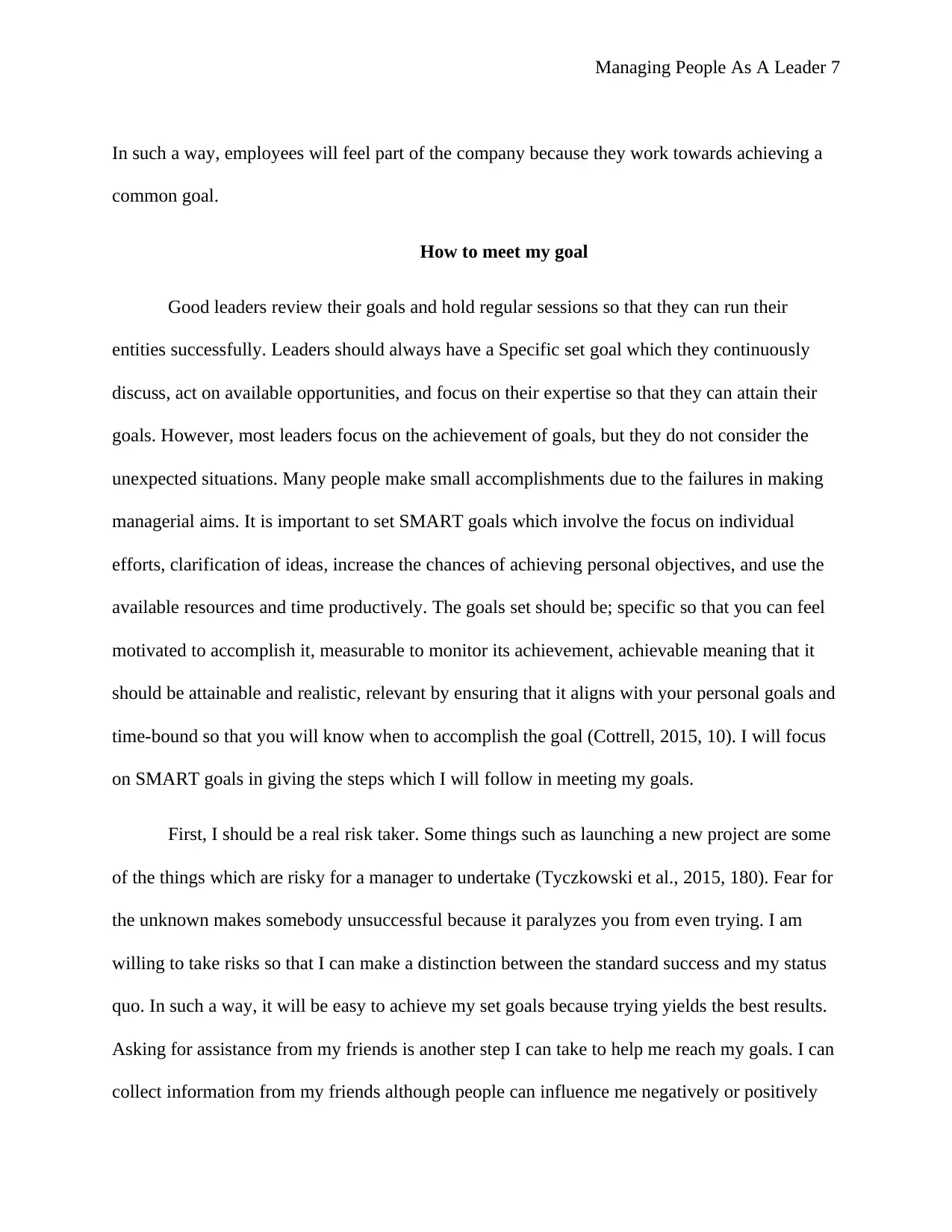
Managing People As A Leader 7
In such a way, employees will feel part of the company because they work towards achieving a
common goal.
How to meet my goal
Good leaders review their goals and hold regular sessions so that they can run their
entities successfully. Leaders should always have a Specific set goal which they continuously
discuss, act on available opportunities, and focus on their expertise so that they can attain their
goals. However, most leaders focus on the achievement of goals, but they do not consider the
unexpected situations. Many people make small accomplishments due to the failures in making
managerial aims. It is important to set SMART goals which involve the focus on individual
efforts, clarification of ideas, increase the chances of achieving personal objectives, and use the
available resources and time productively. The goals set should be; specific so that you can feel
motivated to accomplish it, measurable to monitor its achievement, achievable meaning that it
should be attainable and realistic, relevant by ensuring that it aligns with your personal goals and
time-bound so that you will know when to accomplish the goal (Cottrell, 2015, 10). I will focus
on SMART goals in giving the steps which I will follow in meeting my goals.
First, I should be a real risk taker. Some things such as launching a new project are some
of the things which are risky for a manager to undertake (Tyczkowski et al., 2015, 180). Fear for
the unknown makes somebody unsuccessful because it paralyzes you from even trying. I am
willing to take risks so that I can make a distinction between the standard success and my status
quo. In such a way, it will be easy to achieve my set goals because trying yields the best results.
Asking for assistance from my friends is another step I can take to help me reach my goals. I can
collect information from my friends although people can influence me negatively or positively
In such a way, employees will feel part of the company because they work towards achieving a
common goal.
How to meet my goal
Good leaders review their goals and hold regular sessions so that they can run their
entities successfully. Leaders should always have a Specific set goal which they continuously
discuss, act on available opportunities, and focus on their expertise so that they can attain their
goals. However, most leaders focus on the achievement of goals, but they do not consider the
unexpected situations. Many people make small accomplishments due to the failures in making
managerial aims. It is important to set SMART goals which involve the focus on individual
efforts, clarification of ideas, increase the chances of achieving personal objectives, and use the
available resources and time productively. The goals set should be; specific so that you can feel
motivated to accomplish it, measurable to monitor its achievement, achievable meaning that it
should be attainable and realistic, relevant by ensuring that it aligns with your personal goals and
time-bound so that you will know when to accomplish the goal (Cottrell, 2015, 10). I will focus
on SMART goals in giving the steps which I will follow in meeting my goals.
First, I should be a real risk taker. Some things such as launching a new project are some
of the things which are risky for a manager to undertake (Tyczkowski et al., 2015, 180). Fear for
the unknown makes somebody unsuccessful because it paralyzes you from even trying. I am
willing to take risks so that I can make a distinction between the standard success and my status
quo. In such a way, it will be easy to achieve my set goals because trying yields the best results.
Asking for assistance from my friends is another step I can take to help me reach my goals. I can
collect information from my friends although people can influence me negatively or positively
Paraphrase This Document
Need a fresh take? Get an instant paraphrase of this document with our AI Paraphraser
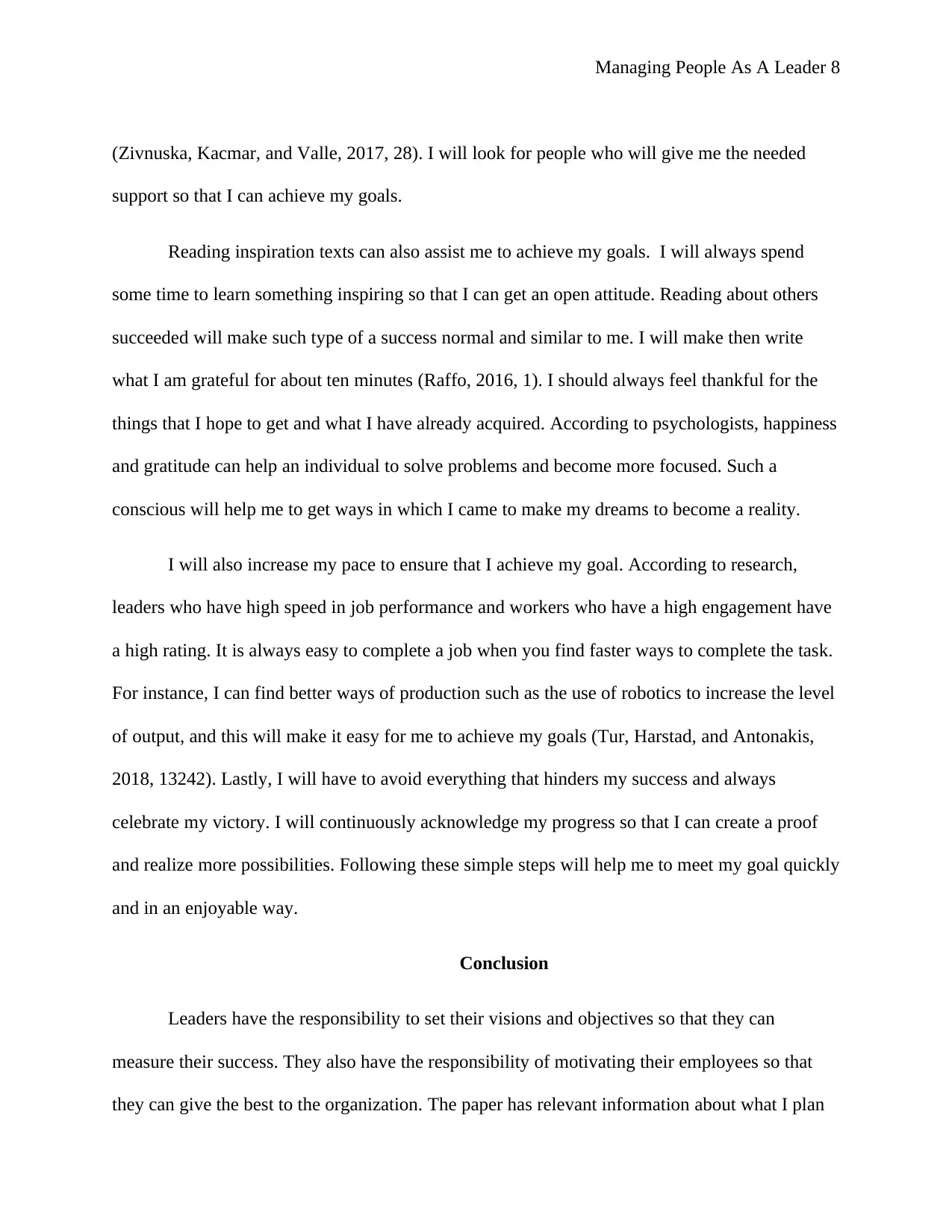
Managing People As A Leader 8
(Zivnuska, Kacmar, and Valle, 2017, 28). I will look for people who will give me the needed
support so that I can achieve my goals.
Reading inspiration texts can also assist me to achieve my goals. I will always spend
some time to learn something inspiring so that I can get an open attitude. Reading about others
succeeded will make such type of a success normal and similar to me. I will make then write
what I am grateful for about ten minutes (Raffo, 2016, 1). I should always feel thankful for the
things that I hope to get and what I have already acquired. According to psychologists, happiness
and gratitude can help an individual to solve problems and become more focused. Such a
conscious will help me to get ways in which I came to make my dreams to become a reality.
I will also increase my pace to ensure that I achieve my goal. According to research,
leaders who have high speed in job performance and workers who have a high engagement have
a high rating. It is always easy to complete a job when you find faster ways to complete the task.
For instance, I can find better ways of production such as the use of robotics to increase the level
of output, and this will make it easy for me to achieve my goals (Tur, Harstad, and Antonakis,
2018, 13242). Lastly, I will have to avoid everything that hinders my success and always
celebrate my victory. I will continuously acknowledge my progress so that I can create a proof
and realize more possibilities. Following these simple steps will help me to meet my goal quickly
and in an enjoyable way.
Conclusion
Leaders have the responsibility to set their visions and objectives so that they can
measure their success. They also have the responsibility of motivating their employees so that
they can give the best to the organization. The paper has relevant information about what I plan
(Zivnuska, Kacmar, and Valle, 2017, 28). I will look for people who will give me the needed
support so that I can achieve my goals.
Reading inspiration texts can also assist me to achieve my goals. I will always spend
some time to learn something inspiring so that I can get an open attitude. Reading about others
succeeded will make such type of a success normal and similar to me. I will make then write
what I am grateful for about ten minutes (Raffo, 2016, 1). I should always feel thankful for the
things that I hope to get and what I have already acquired. According to psychologists, happiness
and gratitude can help an individual to solve problems and become more focused. Such a
conscious will help me to get ways in which I came to make my dreams to become a reality.
I will also increase my pace to ensure that I achieve my goal. According to research,
leaders who have high speed in job performance and workers who have a high engagement have
a high rating. It is always easy to complete a job when you find faster ways to complete the task.
For instance, I can find better ways of production such as the use of robotics to increase the level
of output, and this will make it easy for me to achieve my goals (Tur, Harstad, and Antonakis,
2018, 13242). Lastly, I will have to avoid everything that hinders my success and always
celebrate my victory. I will continuously acknowledge my progress so that I can create a proof
and realize more possibilities. Following these simple steps will help me to meet my goal quickly
and in an enjoyable way.
Conclusion
Leaders have the responsibility to set their visions and objectives so that they can
measure their success. They also have the responsibility of motivating their employees so that
they can give the best to the organization. The paper has relevant information about what I plan
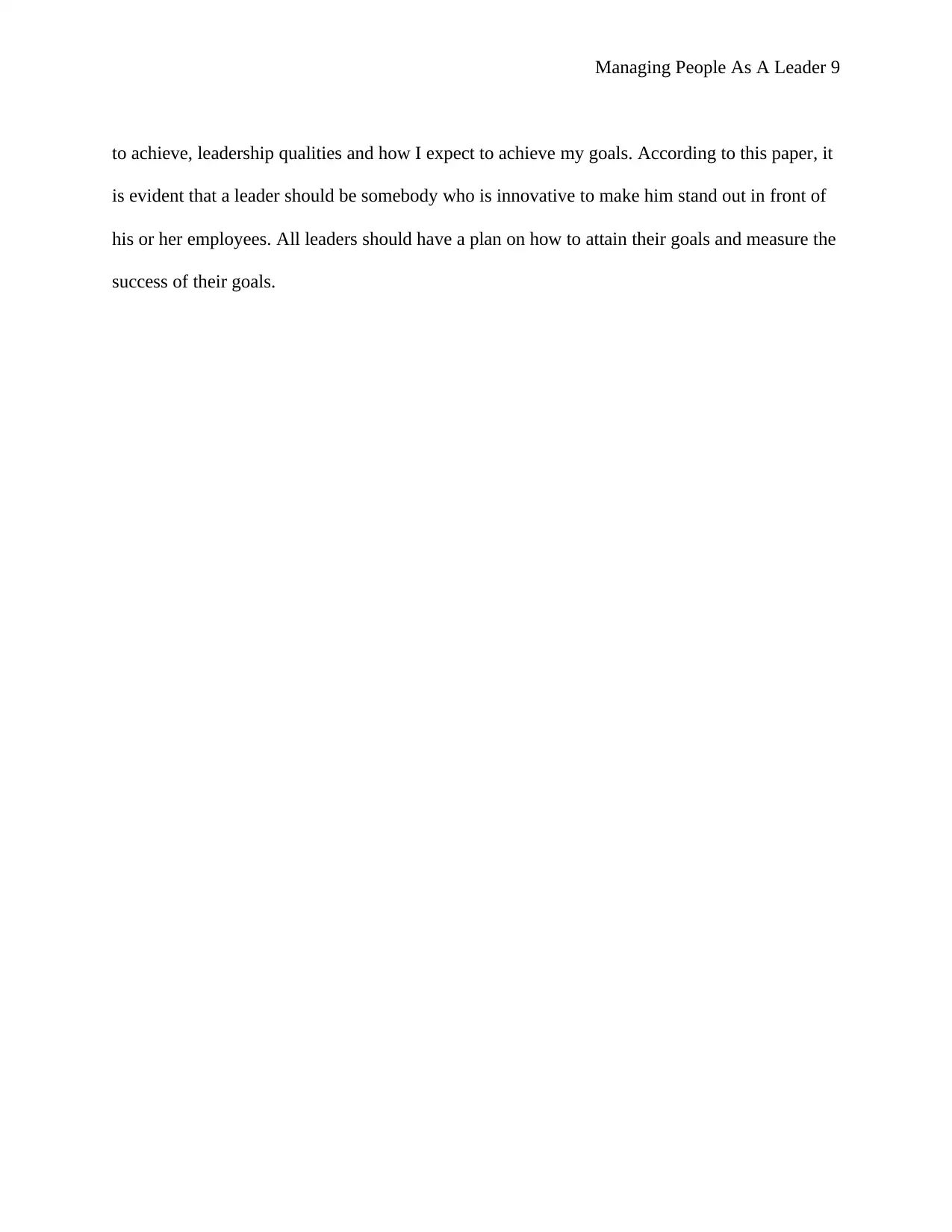
Managing People As A Leader 9
to achieve, leadership qualities and how I expect to achieve my goals. According to this paper, it
is evident that a leader should be somebody who is innovative to make him stand out in front of
his or her employees. All leaders should have a plan on how to attain their goals and measure the
success of their goals.
to achieve, leadership qualities and how I expect to achieve my goals. According to this paper, it
is evident that a leader should be somebody who is innovative to make him stand out in front of
his or her employees. All leaders should have a plan on how to attain their goals and measure the
success of their goals.
⊘ This is a preview!⊘
Do you want full access?
Subscribe today to unlock all pages.

Trusted by 1+ million students worldwide
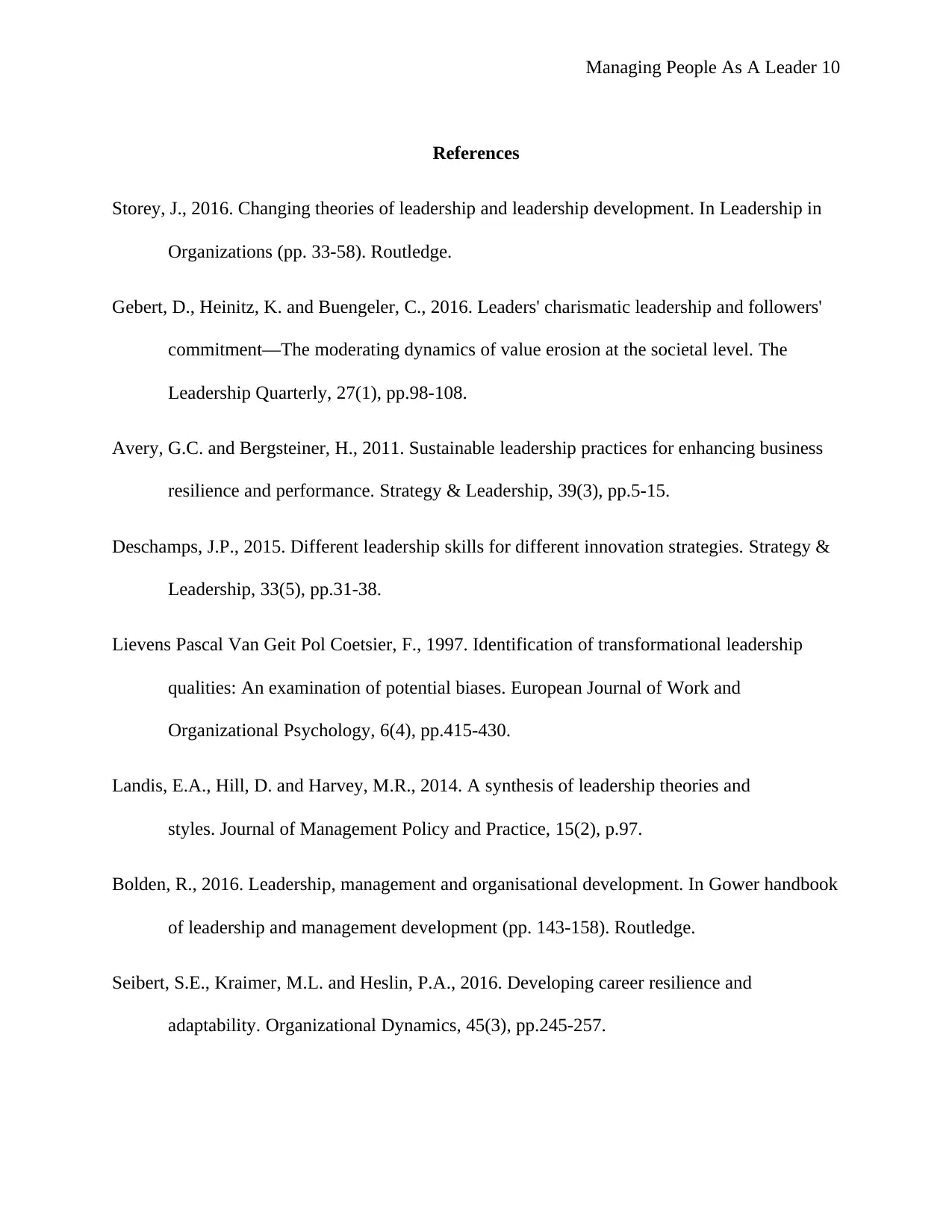
Managing People As A Leader 10
References
Storey, J., 2016. Changing theories of leadership and leadership development. In Leadership in
Organizations (pp. 33-58). Routledge.
Gebert, D., Heinitz, K. and Buengeler, C., 2016. Leaders' charismatic leadership and followers'
commitment—The moderating dynamics of value erosion at the societal level. The
Leadership Quarterly, 27(1), pp.98-108.
Avery, G.C. and Bergsteiner, H., 2011. Sustainable leadership practices for enhancing business
resilience and performance. Strategy & Leadership, 39(3), pp.5-15.
Deschamps, J.P., 2015. Different leadership skills for different innovation strategies. Strategy &
Leadership, 33(5), pp.31-38.
Lievens Pascal Van Geit Pol Coetsier, F., 1997. Identification of transformational leadership
qualities: An examination of potential biases. European Journal of Work and
Organizational Psychology, 6(4), pp.415-430.
Landis, E.A., Hill, D. and Harvey, M.R., 2014. A synthesis of leadership theories and
styles. Journal of Management Policy and Practice, 15(2), p.97.
Bolden, R., 2016. Leadership, management and organisational development. In Gower handbook
of leadership and management development (pp. 143-158). Routledge.
Seibert, S.E., Kraimer, M.L. and Heslin, P.A., 2016. Developing career resilience and
adaptability. Organizational Dynamics, 45(3), pp.245-257.
References
Storey, J., 2016. Changing theories of leadership and leadership development. In Leadership in
Organizations (pp. 33-58). Routledge.
Gebert, D., Heinitz, K. and Buengeler, C., 2016. Leaders' charismatic leadership and followers'
commitment—The moderating dynamics of value erosion at the societal level. The
Leadership Quarterly, 27(1), pp.98-108.
Avery, G.C. and Bergsteiner, H., 2011. Sustainable leadership practices for enhancing business
resilience and performance. Strategy & Leadership, 39(3), pp.5-15.
Deschamps, J.P., 2015. Different leadership skills for different innovation strategies. Strategy &
Leadership, 33(5), pp.31-38.
Lievens Pascal Van Geit Pol Coetsier, F., 1997. Identification of transformational leadership
qualities: An examination of potential biases. European Journal of Work and
Organizational Psychology, 6(4), pp.415-430.
Landis, E.A., Hill, D. and Harvey, M.R., 2014. A synthesis of leadership theories and
styles. Journal of Management Policy and Practice, 15(2), p.97.
Bolden, R., 2016. Leadership, management and organisational development. In Gower handbook
of leadership and management development (pp. 143-158). Routledge.
Seibert, S.E., Kraimer, M.L. and Heslin, P.A., 2016. Developing career resilience and
adaptability. Organizational Dynamics, 45(3), pp.245-257.
Paraphrase This Document
Need a fresh take? Get an instant paraphrase of this document with our AI Paraphraser
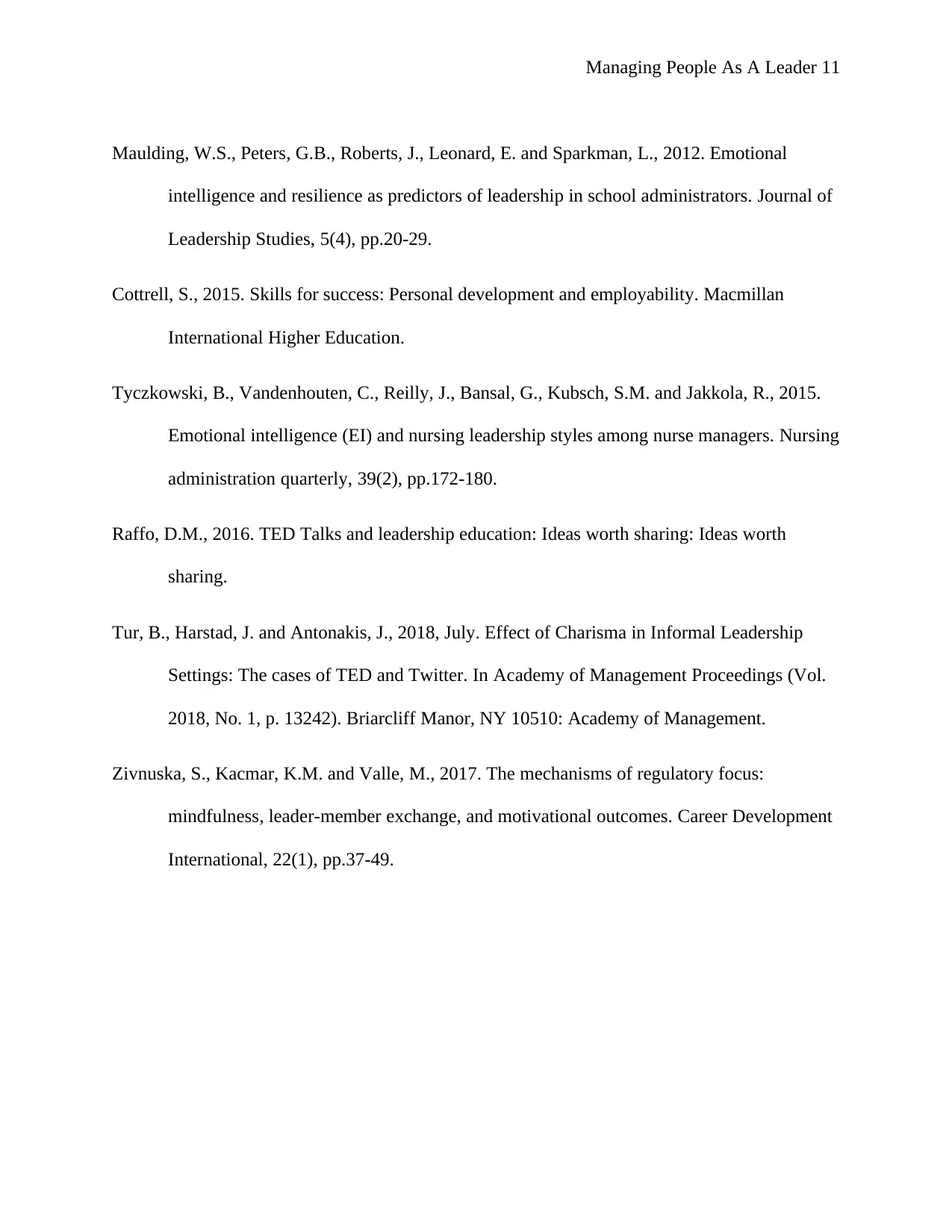
Managing People As A Leader 11
Maulding, W.S., Peters, G.B., Roberts, J., Leonard, E. and Sparkman, L., 2012. Emotional
intelligence and resilience as predictors of leadership in school administrators. Journal of
Leadership Studies, 5(4), pp.20-29.
Cottrell, S., 2015. Skills for success: Personal development and employability. Macmillan
International Higher Education.
Tyczkowski, B., Vandenhouten, C., Reilly, J., Bansal, G., Kubsch, S.M. and Jakkola, R., 2015.
Emotional intelligence (EI) and nursing leadership styles among nurse managers. Nursing
administration quarterly, 39(2), pp.172-180.
Raffo, D.M., 2016. TED Talks and leadership education: Ideas worth sharing: Ideas worth
sharing.
Tur, B., Harstad, J. and Antonakis, J., 2018, July. Effect of Charisma in Informal Leadership
Settings: The cases of TED and Twitter. In Academy of Management Proceedings (Vol.
2018, No. 1, p. 13242). Briarcliff Manor, NY 10510: Academy of Management.
Zivnuska, S., Kacmar, K.M. and Valle, M., 2017. The mechanisms of regulatory focus:
mindfulness, leader-member exchange, and motivational outcomes. Career Development
International, 22(1), pp.37-49.
Maulding, W.S., Peters, G.B., Roberts, J., Leonard, E. and Sparkman, L., 2012. Emotional
intelligence and resilience as predictors of leadership in school administrators. Journal of
Leadership Studies, 5(4), pp.20-29.
Cottrell, S., 2015. Skills for success: Personal development and employability. Macmillan
International Higher Education.
Tyczkowski, B., Vandenhouten, C., Reilly, J., Bansal, G., Kubsch, S.M. and Jakkola, R., 2015.
Emotional intelligence (EI) and nursing leadership styles among nurse managers. Nursing
administration quarterly, 39(2), pp.172-180.
Raffo, D.M., 2016. TED Talks and leadership education: Ideas worth sharing: Ideas worth
sharing.
Tur, B., Harstad, J. and Antonakis, J., 2018, July. Effect of Charisma in Informal Leadership
Settings: The cases of TED and Twitter. In Academy of Management Proceedings (Vol.
2018, No. 1, p. 13242). Briarcliff Manor, NY 10510: Academy of Management.
Zivnuska, S., Kacmar, K.M. and Valle, M., 2017. The mechanisms of regulatory focus:
mindfulness, leader-member exchange, and motivational outcomes. Career Development
International, 22(1), pp.37-49.
1 out of 11
Related Documents
Your All-in-One AI-Powered Toolkit for Academic Success.
+13062052269
info@desklib.com
Available 24*7 on WhatsApp / Email
![[object Object]](/_next/static/media/star-bottom.7253800d.svg)
Unlock your academic potential
Copyright © 2020–2026 A2Z Services. All Rights Reserved. Developed and managed by ZUCOL.




